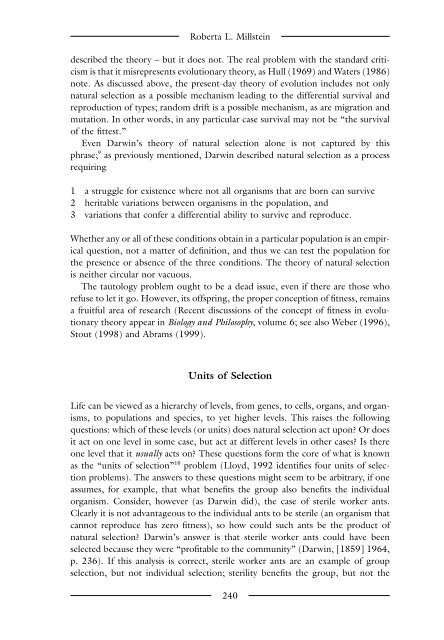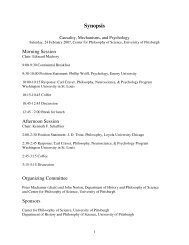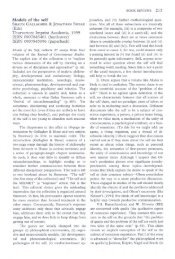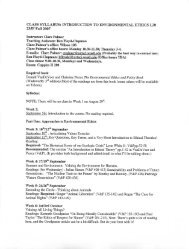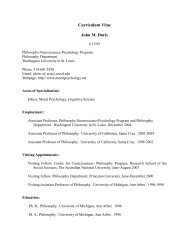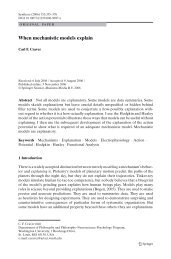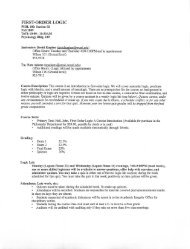The Blackwell Guide to the Philosophy of Science - The Department ...
The Blackwell Guide to the Philosophy of Science - The Department ...
The Blackwell Guide to the Philosophy of Science - The Department ...
You also want an ePaper? Increase the reach of your titles
YUMPU automatically turns print PDFs into web optimized ePapers that Google loves.
Roberta L. Millstein<br />
described <strong>the</strong> <strong>the</strong>ory – but it does not. <strong>The</strong> real problem with <strong>the</strong> standard criticism<br />
is that it misrepresents evolutionary <strong>the</strong>ory, as Hull (1969) and Waters (1986)<br />
note. As discussed above, <strong>the</strong> present-day <strong>the</strong>ory <strong>of</strong> evolution includes not only<br />
natural selection as a possible mechanism leading <strong>to</strong> <strong>the</strong> differential survival and<br />
reproduction <strong>of</strong> types; random drift is a possible mechanism, as are migration and<br />
mutation. In o<strong>the</strong>r words, in any particular case survival may not be “<strong>the</strong> survival<br />
<strong>of</strong> <strong>the</strong> fittest.”<br />
Even Darwin’s <strong>the</strong>ory <strong>of</strong> natural selection alone is not captured by this<br />
phrase; 9 as previously mentioned, Darwin described natural selection as a process<br />
requiring<br />
1 a struggle for existence where not all organisms that are born can survive<br />
2 heritable variations between organisms in <strong>the</strong> population, and<br />
3 variations that confer a differential ability <strong>to</strong> survive and reproduce.<br />
Whe<strong>the</strong>r any or all <strong>of</strong> <strong>the</strong>se conditions obtain in a particular population is an empirical<br />
question, not a matter <strong>of</strong> definition, and thus we can test <strong>the</strong> population for<br />
<strong>the</strong> presence or absence <strong>of</strong> <strong>the</strong> three conditions. <strong>The</strong> <strong>the</strong>ory <strong>of</strong> natural selection<br />
is nei<strong>the</strong>r circular nor vacuous.<br />
<strong>The</strong> tau<strong>to</strong>logy problem ought <strong>to</strong> be a dead issue, even if <strong>the</strong>re are those who<br />
refuse <strong>to</strong> let it go. However, its <strong>of</strong>fspring, <strong>the</strong> proper conception <strong>of</strong> fitness, remains<br />
a fruitful area <strong>of</strong> research (Recent discussions <strong>of</strong> <strong>the</strong> concept <strong>of</strong> fitness in evolutionary<br />
<strong>the</strong>ory appear in Biology and <strong>Philosophy</strong>, volume 6; see also Weber (1996),<br />
S<strong>to</strong>ut (1998) and Abrams (1999).<br />
Units <strong>of</strong> Selection<br />
Life can be viewed as a hierarchy <strong>of</strong> levels, from genes, <strong>to</strong> cells, organs, and organisms,<br />
<strong>to</strong> populations and species, <strong>to</strong> yet higher levels. This raises <strong>the</strong> following<br />
questions: which <strong>of</strong> <strong>the</strong>se levels (or units) does natural selection act upon? Or does<br />
it act on one level in some case, but act at different levels in o<strong>the</strong>r cases? Is <strong>the</strong>re<br />
one level that it usually acts on? <strong>The</strong>se questions form <strong>the</strong> core <strong>of</strong> what is known<br />
as <strong>the</strong> “units <strong>of</strong> selection” 10 problem (Lloyd, 1992 identifies four units <strong>of</strong> selection<br />
problems). <strong>The</strong> answers <strong>to</strong> <strong>the</strong>se questions might seem <strong>to</strong> be arbitrary, if one<br />
assumes, for example, that what benefits <strong>the</strong> group also benefits <strong>the</strong> individual<br />
organism. Consider, however (as Darwin did), <strong>the</strong> case <strong>of</strong> sterile worker ants.<br />
Clearly it is not advantageous <strong>to</strong> <strong>the</strong> individual ants <strong>to</strong> be sterile (an organism that<br />
cannot reproduce has zero fitness), so how could such ants be <strong>the</strong> product <strong>of</strong><br />
natural selection? Darwin’s answer is that sterile worker ants could have been<br />
selected because <strong>the</strong>y were “pr<strong>of</strong>itable <strong>to</strong> <strong>the</strong> community” (Darwin, [1859] 1964,<br />
p. 236). If this analysis is correct, sterile worker ants are an example <strong>of</strong> group<br />
selection, but not individual selection; sterility benefits <strong>the</strong> group, but not <strong>the</strong><br />
240


